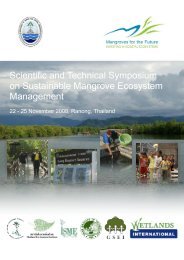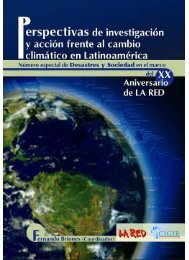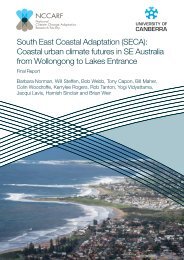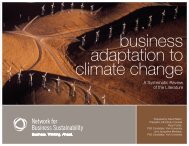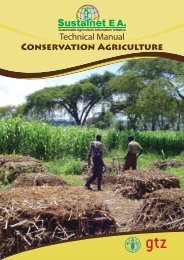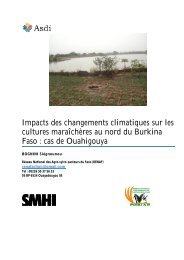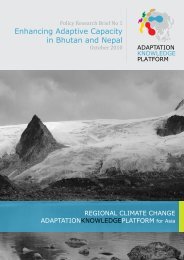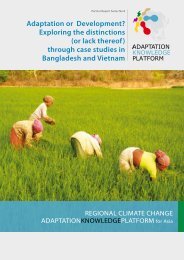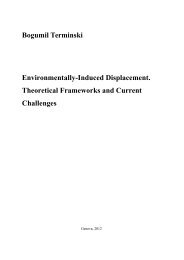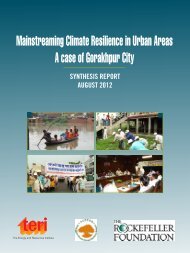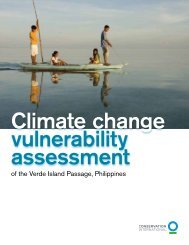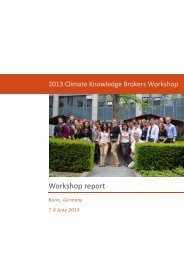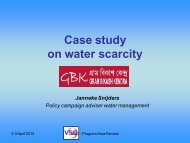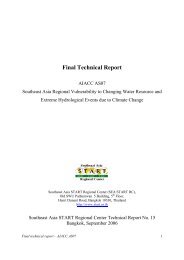a stronger focus on addressing the factors that underlie <strong>food</strong> <strong>security</strong>, such ashealthy <strong>urban</strong> planning, <strong>and</strong> access to employment, affordable housing <strong>and</strong>planning.Furthermore, a number of the participating councils were also incorporating, for the firsttime, <strong>food</strong> supply <strong>and</strong> <strong>food</strong> <strong>security</strong> issues into their Municipal Strategic Statements. Inaddition, <strong>food</strong> <strong>security</strong> <strong>and</strong> related issues had been incorporated by 2010, into 21 plansacross community services divisions in the various councils, <strong>and</strong> in 20 plans developedin infrastructure divisions.There has been less concerted action around local or municipal <strong>food</strong> <strong>security</strong> inQueensl<strong>and</strong> where, again, agriculture is seen primarily as a rural activity, albeit one ofthe ‘four pillars’ of the state’s economy identified by the Newman government. There islittle evidence that <strong>food</strong> <strong>security</strong> is seen as a pressing issue facing cities within thestate, although there has been (until recently) some policy attention given to thepotential for greater <strong>food</strong> production in <strong>urban</strong> <strong>and</strong> peri-<strong>urban</strong> settings.Gold Coast City Council did, however, identify local <strong>food</strong> production as an importantelement in its <strong>climate</strong> <strong>change</strong> adaptation strategy <strong>and</strong> commissioned a scoping study oflocal <strong>food</strong> production <strong>and</strong> purchase (GCCC, 2011). This included <strong>urban</strong> <strong>food</strong> <strong>security</strong> ina more holistic manner <strong>and</strong> recognises the environmental, economic <strong>and</strong> socialbenefits of developing a more integrated <strong>and</strong> extensive local <strong>food</strong> system.On the Gold Coast, <strong>food</strong> <strong>security</strong> has been explored at the individual level, with anincreased emphasis on <strong>food</strong> production <strong>and</strong> sharing initiatives:Food <strong>security</strong> is not having to go down to the shop <strong>and</strong> buy your own. It's aboutgrowing your own, <strong>and</strong> so in terms of <strong>food</strong> <strong>security</strong> for people it cuts down on<strong>food</strong> miles <strong>and</strong> that's a good thing. But it's really not generating much in the wayof people's <strong>food</strong> <strong>security</strong>, if they come here <strong>and</strong> buy stuff all the time. We've gotpeople who come here <strong>and</strong> they've looked at us <strong>and</strong> again some of theunemployed people, like that guy I was just talking about who’s now employedfull-time. He lives in a boarding house <strong>and</strong> he's got this massive <strong>food</strong> garden inthe back of a boarding house <strong>and</strong> so he's cooking with gas. Another guy, an artistwho paints our beehives – we've got two artists – <strong>and</strong> he's all fired up <strong>and</strong> he'staken water weed <strong>and</strong> you name it home to build his own garden. I guess it'sgood in a way here that it provides <strong>security</strong> for people to have an alternative form,like an alternative production area for <strong>food</strong> so that if something goes wrongsomewhere else, then okay, there's always there's <strong>food</strong> here. They could comehere instead of going to the supermarket but yeah, I'd really like to see morepeople growing their own stuff [Market gardener <strong>and</strong> permaculturalist, GoldCoast].This notion of <strong>food</strong> <strong>resilience</strong> also resonates quite strongly with community <strong>and</strong>individual <strong>urban</strong> agricultural practitioners interviewed during these case studies. Manyof these interviewees expressed their underst<strong>and</strong>ing of <strong>food</strong> <strong>security</strong> in terms of greaterlevels of individual <strong>and</strong> community self-sufficiency. They talked about ‘people growingtheir own <strong>food</strong>’; <strong>and</strong> activities such as <strong>food</strong> sharing <strong>and</strong> <strong>food</strong> swaps (mainly of producegrown in backyards), seed sharing, <strong>and</strong> plant ex<strong>change</strong>s. Angelo Eliades, whose<strong>Urban</strong> <strong>food</strong> <strong>security</strong>, <strong>urban</strong> <strong>resilience</strong> <strong>and</strong> <strong>climate</strong> <strong>change</strong> 33
ackyard <strong>food</strong> forest, discussed in more detail below, spoke on behalf of himself <strong>and</strong>his fellow local permaculturalists in Melbourne in saying:Our focus is about people producing their own <strong>food</strong>. We’re about <strong>food</strong> <strong>security</strong> asgrowing <strong>food</strong> to keep people alive, not <strong>food</strong> <strong>security</strong> as producing <strong>food</strong> as acommodity for a consumerist society. [Food is] not a means of making money, it’sa means of keeping people alive. Our focus isn’t on yields <strong>and</strong> produce, at thecost of quality. Our focus is to produce yields <strong>and</strong> big harvests with the highest ofquality. We’re aiming at <strong>food</strong> that has high nutritional value, <strong>and</strong> long-term hasbenefits in terms of reducing government outlays on health.Another interviewee, from a social enterprise, alluded directly to the principles ofpermaculture in her conception of <strong>food</strong> <strong>security</strong>:It’s all very much a part of consciously living in a far more environmentallysustainable way, which takes into consideration environmental justice <strong>and</strong> socialjustice. It is about looking after the needs of people – the permaculture principles,care of people, care of earth, share of surplus – they’re kind of basic, but theywork [Manager, social enterprise].A clear example of the perceived benefits of self-reliance <strong>and</strong> becoming individuallymore <strong>food</strong> secure is presented by an organic grower <strong>and</strong> activist from the Gold Coast.Her experiences with the Brisbane floods were both dramatic <strong>and</strong> enriching:Well, for instance when we had the floods <strong>and</strong> people couldn’t get milk everyonewent nuts because they couldn’t get milk for what was it a day or two? And thenthe price of vegetables when through the roof. Well, yeah, those kinds of floodsaffected us too <strong>and</strong> you know some of the stuff in our garden fell over <strong>and</strong> diedas well but there were things there that we wouldn’t have starved, we might havegot a little bit hungry <strong>and</strong> baked beans might have been on the menu for a fewnights, but it would have been with some salad <strong>and</strong> parsley <strong>and</strong> grind up a greenpaw-paw for a nice Thai green paw-paw salad, you wouldn’t have just survived,you could have lived [Non-government organisation employee, Gold Coast].Adding another dimension to the debate, academic researchers were especiallyconcerned about the issues of environmental sustainability, intergenerational equity,<strong>climate</strong> <strong>change</strong>, resource <strong>resilience</strong>, <strong>and</strong> fairness. One offered this multi-dimensionalconceptualisation of <strong>food</strong> <strong>security</strong>:Food <strong>security</strong> is sufficient, equitably accessible <strong>and</strong> sustainable <strong>food</strong>.Sustainability in this context means <strong>food</strong> produced in such a way that doesn’tundermine the ability of future generations to meet their own <strong>food</strong> needs. That’sreally important, <strong>and</strong> isn’t talked about enough, especially in relation to water <strong>and</strong>l<strong>and</strong> issues, on the peri-<strong>urban</strong> fringe.Secondly, that we’re meeting <strong>food</strong> needs into the future, taking into account theconditions we’re likely to face into the future. That’s to say, oil, l<strong>and</strong> <strong>and</strong> water allbecoming more scarce, <strong>and</strong> the price of oil becoming more expensive. And the<strong>climate</strong> <strong>change</strong> implications that I believe we’re going to face, <strong>and</strong> that we’realready starting to see …<strong>Urban</strong> <strong>food</strong> <strong>security</strong>, <strong>urban</strong> <strong>resilience</strong> <strong>and</strong> <strong>climate</strong> <strong>change</strong> 34
- Page 1 and 2: Synthesis and Integrative ResearchF
- Page 3 and 4: Published by the National Climate C
- Page 5 and 6: ABSTRACTFood security is increasing
- Page 7 and 8: 1. a review of the literature: on n
- Page 9 and 10: its Food for All project. This help
- Page 13 and 14: In response to the existential thre
- Page 15 and 16: 2. OBJECTIVES OF THE RESEARCHFood i
- Page 17 and 18: debates and to the more systematic
- Page 19 and 20: organisation in the past few years.
- Page 21 and 22: 4. RESULTSIn this section we presen
- Page 23 and 24: increasing productivity. Thus, whil
- Page 25 and 26: people and the origins of their foo
- Page 27 and 28: urban food supply chains. Thus, whi
- Page 29 and 30: This logistics system is dominated
- Page 31 and 32: Like Hodgson et al., as per definit
- Page 33 and 34: esilient, powerful by being locally
- Page 35 and 36: volume or even its contribution to
- Page 37: community food growing can have on
- Page 40 and 41: generations this history has been f
- Page 44 and 45: The third key aspect is fairness -
- Page 46 and 47: climate (which we live and work in
- Page 48 and 49: agriculture. Eight percent is in ur
- Page 50 and 51: This concept of the ‘spaces in be
- Page 52 and 53: esearch scientist and chair of the
- Page 54 and 55: As discussed above, protection of t
- Page 56: 4.2.5 What is the extent and the im
- Page 60 and 61: no place under the panoply of pract
- Page 62 and 63: increased, the market dominance of
- Page 64 and 65: … the residents of S Park called
- Page 66 and 67: 5. CONCLUSIONSThere is growing conc
- Page 68 and 69: urban resilience. This inevitably c
- Page 70 and 71: In many respects these contrasting
- Page 72 and 73: Many interviewees of both standpoin
- Page 74 and 75: a given area. The rationale for thi
- Page 76 and 77: mapping the location of sources of
- Page 78 and 79: Australian food policy debates refl
- Page 80 and 81: APPENDIX 1: URBAN FOOD SECURITY, UR
- Page 82 and 83: IntroductionGlobally, and in Austra
- Page 84 and 85: Review methodsThis stage of the res
- Page 86 and 87: despite many of the causes of food
- Page 88 and 89: …by 2050… food production will
- Page 90 and 91: 2. How is food security (in general
- Page 92 and 93:
the food security of cities, but no
- Page 94 and 95:
While some see the density of devel
- Page 96 and 97:
when suppliers, distributors, and c
- Page 98 and 99:
a more prominent role in enhancing
- Page 100 and 101:
community gardens webpage on the Co
- Page 102 and 103:
comprehensive description of the ca
- Page 104 and 105:
In both the developed and developin
- Page 106 and 107:
Their review notes a significant in
- Page 108 and 109:
lines of supply from often rural pl
- Page 110 and 111:
1 IntroductionCities have always be
- Page 112 and 113:
Despite some attempts to curb urban
- Page 114 and 115:
the Gold Coast remains a city that
- Page 116 and 117:
ackyard/community gardenernot affil
- Page 118 and 119:
level in local government. VicHealt
- Page 120:
Figure 2: Impacts on Municipal Food
- Page 125 and 126:
security I recognise that the cost
- Page 127 and 128:
United States, he offered the follo
- Page 129 and 130:
This vision highlights the multi-fu
- Page 131 and 132:
An environmental education centre.
- Page 133 and 134:
Melbourne Food ForestA Melbourne ga
- Page 135 and 136:
stakeholder consultations, the repo
- Page 137 and 138:
can. We sense the changes. The earl
- Page 139 and 140:
half-desert environments. We’re g
- Page 141 and 142:
etain its basic function and struct
- Page 143 and 144:
government; and that trying to get
- Page 145 and 146:
the north and the west, where it wo
- Page 147 and 148:
Why do people buy so much food that
- Page 149 and 150:
urban agriculture (however broadly
- Page 151 and 152:
enefits and risks. Before we can co
- Page 153 and 154:
Another important and tangible role
- Page 155 and 156:
coast without any problems whatsoev
- Page 157 and 158:
BIBLIOGRAPHYAECOM (2011) Scoping St
- Page 159 and 160:
Burns, C. I., A. (2007). Measuring
- Page 161 and 162:
Edwards, F., & Mercer, D. (2010). M
- Page 163 and 164:
James, S. O’Neill, P. and Dimeski
- Page 165 and 166:
Millar, R., 2012, ‘Government shi
- Page 167 and 168:
Saltmarsh, N. M., J; Longhurst, N.
- Page 169 and 170:
Walker B., 2008, Resilience Thinkin



